Earlier this year Chappaquiddick — a dramatisation of Ted Kennedy’s involvement in Mary Jo Kopechne’s death — gave us an account of political elites working the levers of power to manage a news cycle and control coverage of a scandal. The Front Runner argues that two decades later, the media landscape had changed, and a scandal-fed news cycle was managing the elites.
The film revisits the 1988 presidential bid of Sen. Gary Hart (Hugh Jackman), a promising Democratic candidate, who led in early polls against presumptive Republican nominee George H W Bush after he announced his candidacy. Hart has an above-it-all air about him (he holds his campaign announcement at 10,000 feet, in his home state of Colorado), and the movie more or less sides with him — holding him up as a visionary with ahead-of-his-time views on the environment and technology.
Hart’s views on the perks of being a handsome alpha male in the D.C. seat of power were somewhat more traditional — Hart was often described as Kennedy-esque, and in his case the reference included speculation about affairs. Reporters vetting his character wondered about frequent separations from his wife (Vera Farmiga), and when the candidate brushed off such speculation by suggesting that reporters who followed him would be bored, he tempted fate.
As we see in The Front Runner, some Miami Herald reporters did follow him, after being tipped off that Hart had met a young woman named Donna Rice in Florida aboard a boat called the Monkey Business, and that she was visiting the candidate in Washington. A stake-out revealed that she was indeed spending a great deal of time there.
Were they having an affair? The movie doesn’t answer the question, and therefore seems to align itself with Hart, who declared it to be immaterial to presidential qualifications. Ari Graynor turns up as a Washington Post reporter who argues the opposite, giving voice to #MeToo movement concerns, but you can feel director Jason Reitman’s affinity for Hart’s position that a candidate’s policy positions are vastly more important than personal peccadilloes.
The Front Runner notes (as did last year’s The Post) that the national press corps had traditionally looked the other way on extramarital activity, and wonders what might have happened had Hart’s dalliance with Rice been ignored. Hart might well have won, changing the course of history (in the movie’s view) for the better. Hart’s inevitability is debatable — he’s the same guy who lost a primary fight some years earlier to the hardly charismatic or visionary Walter Mondale.
But, the movie is correct to suggest that the Hart fiasco was fueled by a new media configuration, with new priorities — the advent of the 24-hour news cycle and its snowballing, self-feeding news frenzies. The Front Runner shows print reporters elbow-to-elbow with tabloid TV correspondents who are commandeering the tone of coverage. In one scene, a Herald scribe withdraws from the fray, clearly alarmed by the spectacle his story has helped create.
Hart, though, is a disconcertingly off-putting figure in The Front Runner. As played by Jackman, he’s imperious, self-righteous, and humourless, and it’s hard to imagine such a figure capturing the imagination of the public, policy acumen notwithstanding. The movie is better at showing Rice (Sara Paxton) as a woman trampled by the press stampede — ditto Hart’s wife Lee, played elegantly by Farmiga. – The Philadelphia Inquirer/TNS

Movie
